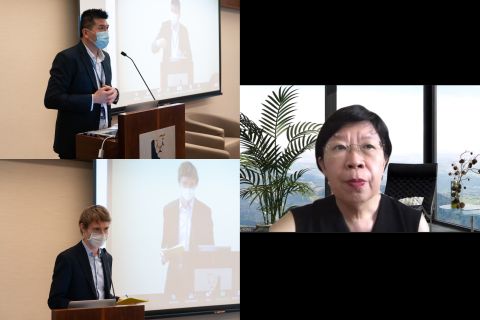
By Michelle Lee Twan Gee
SMU Office of Research & Tech Transfer – There have been many studies about the impact of social media use. Most of them, however, focused on the impact of social media use amongst younger adults, who are earlier adopters and heavier users of these technologies.
This lack of research on older adults’ use of social media is despite the substantial increase in social media use in this age group in the past few years.
Four in 10 seniors in the U.S. now own smartphones, more than double the share that did so in 2013. They are also surfing the Internet in greater numbers than before; today, 67 percent of American adults aged 65 and older go online.
PhD in Psychology student Shuna Khoo and her advisor, SMU Associate Professor of Psychology Yang Hwajin, felt that there was a need to better understand how the use of social media would affect older adults psychologically and cognitively.
Describes Khoo: “Specifically, our study sought to examine whether social media use influences important factors for successful ageing, such as middle-aged and older adults’ social support, sense of control and executive functioning.”
Executive functions are a set of critical cognitive functions that support working memory, flexible thinking, and self-control. These cognitive functions are used to learn, work and manage daily life. Impairment in executive functions could result in difficulty in focusing, following directions and handling emotions.
“Given that executive functioning contributes to important life outcomes such as life satisfaction and purpose in late adulthood - which are regarded as vital aspects of healthy ageing - investigating the cognitive implications of social media use in mid- and later life is therefore both timely and crucial.”
She adds, “With the expanding prevalence of social media use and increasing ageing populations around the world, understanding how social media use can positively influence these critical factors for successful ageing could equip middle-aged and older adults to better leverage the use of technology for greater benefits.”
The pair wanted to do more than examine whether social media use would influence successful ageing; they wanted to study how it accomplishes this. In other words, they wanted to uncover the mechanism that drives the relation between social media use and executive functioning in middle and late adulthood.
“Understanding the mechanism provides a more precise explanation regarding how social media use affects middle-aged and older adults’ executive functioning,” says Khoo.
For the study, the two researchers used panel data of a nationally representative cohort of 1,735 participants ranging in age from those in their 40s to those in their 70s from the Midlife in the United States (MIDUS) Refresher Survey and Cognitive Project.
Using data from the MIDUS Refresher Project, the duo modelled a serial mediation model with perceived social support and sense of control (that is, personal mastery and perceived constraints) as sequential mediators between social media use and executive functioning. In other words, they examined how social media use indirectly influenced middle-aged and older adults’ executive functioning, via perceived social support and sense of control – in this specific sequential manner.
They then proceeded to conduct a structural equation modelling analysis, a statistical modelling technique that is widely used in the behavioural sciences to analyse relations between variables, especially latent variables which are purer constructs that mitigated measurement errors.
Does social media use provide cognitive benefits to older adults? It depends.
The answer obtained by the duo as to whether social media use by older adults contributes to successful ageing was a qualified ‘Yes’.
The study demonstrates that middle-aged and older adults’ social media use for social connection can be a useful medium that protects against age-related cognitive decline in executive functioning.
Social media use is beneficial for middle-aged and older adults because social media enables those who are socially isolated or physically constrained to remain connected to their social networks.
States Khoo: “However only specific types of social media use, such as the use of social media for interpersonal interactions that renders social support and reduces a sense of perceived constraints, offer benefits in executive functioning.
“In other words, if the social media use does not render much social support or reduce perceived constraints, then it may not necessarily benefit one’s executive functioning.”
She elaborates: “According to the support-efficacy model, social support for older adults strengthens the internalisation of their self-efficacy and ultimately fosters an internal control belief about their ability to overcome constraints and generate satisfactory outcomes.”
These novel findings could be useful in shaping public policies and guiding public institutions, suggests Khoo.
“Current policymakers and public agencies may not be aware that purposeful use of social media could confer benefits to one’s cognitive functioning. Beyond crafting policies or activities to increase digital literacy among older adults, public institutions could consider educating individuals who are in touch with these older adults (such as their parents and relatives) about more intentional use of social media to confer social support to the older adults.”
This study was published in 2020 in Computers in Human Behavior, a journal dedicated to examining the use of computers and technologies from a psychological perspective.
Shuna Khoo was conferred the 2020 SMU Presidential Doctoral Fellowship for her exceptional research work as an SMU PhD student. In addition, she was also awarded the 2020 SMU Multidisciplinary Doctoral Fellowship, which is conferred on PhD students whose research output show the use of techniques from two or more fields. In Khoo’s case, the two fields are psychology and technology.
Back to Research@SMU Feb 2021 Issue
See More News
Want to see more of SMU Research?
Sign up for Research@SMU e-newslettter to know more about our research and research-related events!
If you would like to remove yourself from all our mailing list, please visit https://eservices.smu.edu.sg/internet/DNC/Default.aspx

